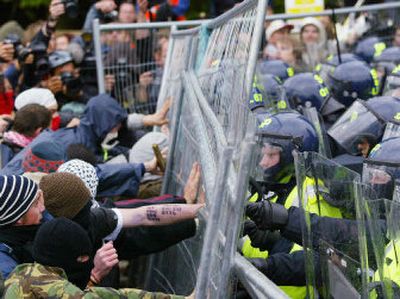G-8 leaders convene

GLASGOW, Scotland – Leaders of the world’s most prosperous nations convened a three-day summit Wednesday to address endemic poverty, environmental neglect and other global challenges, even as President Bush declared his continued opposition to mandatory limits on greenhouse gas emissions.
Outside the tightly guarded conference site, activists intent on disrupting the annual conclave of the Group of 8 nations scuffled with police, tied up traffic and caused some merchants to shutter their shops in the Scottish capital of Edinburgh.
G-8 leaders – representing Britain, France, Germany, Italy, Russia, Japan, Canada and the United States – launched the conference with a private dinner for which Queen Elizabeth and Prince Phillip served as hosts.
Some leaders, including British Prime Minister Tony Blair, the G-8 chairman, have expressed hope the group’s efforts would lead to meaningful progress on difficult and divisive issues such as Africa’s plight, climate change and energy consumption.
Yet even before the summit could get started, Bush said he would resist any efforts to impose the kind of greenhouse gas limits contained in the previously negotiated Kyoto accord, which the United States declined to ratify.
The Kyoto agreement requires its signatories to make significant reductions in emissions of carbon dioxide and other pollutants widely believed to contribute to the gradual warming of the planet, a phenomenon that could have grave long-term environmental consequences.
Although new limits were not on the summit agenda, Blair has been pushing the Bush administration to show more flexibility on the issue. “I think there’s a better way forward,” Bush told reporters during a stop in Denmark on his way to Gleneagles. “I would call it the post-Kyoto era, where we can work together to share technologies, to control greenhouse gases as best as possible.”
That kind of approach appeared unlikely to satisfy many of the activists who have helped turn the summit into a focal point of concern about the effect of policies pursued by G-8 governments on the global economy and environment.
In recent days, tens of thousands of people have gathered in Edinburgh to participate in demonstrations. G-8 officials said they would allow only about 5,000 activists to enter the heavily secured conference site.
Although most protests have been peaceful, a group of hooded radical anarchists attacked cars and stores, and attempted to set up roadblocks and blockades. Police made scores of arrests.
Bush said he hoped the G-8 nations would endorse alternatives to mandatory limits, such as persuading the governments of the world’s emerging energy consumers voluntarily to embrace technological advances that would help reduce greenhouse gas emissions.
Bush signaled his willingness to accept a G-8 statement linking climate change to world energy consumption. “Listen, I recognize that the surface of the Earth is warmer and that an increase in greenhouse gases caused by humans is contributing to the problem,” Bush said.